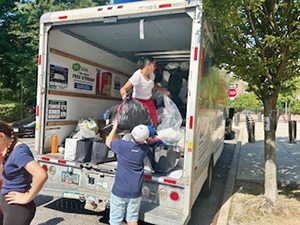
On Sunday, September 15, The Hebrew Institute of Riverdale (HIR) hosted its annual community chesed day in remembrance of September 11, 2001. From 9 a.m. to 3 p.m., people came in to do one or more chesed activities organized by HIR Programming Director Yael Manor-Oshinsky.
Outside the building stood a truck collecting lightly used clothing. Steve Pretzfelder runs the clothing drive at HIR twice a year—before Rosh Hashanah and before Pesach. The clothing is brought to an organization called Furniture Assist, which works with social service agencies to deliver clothing to the needy. “We have an incredible crew of volunteers this year,” noted Pretzfelder, pointing to Ilan Exler, who was celebrating his birthday with his friends, loading the large bags that were being dropped off.
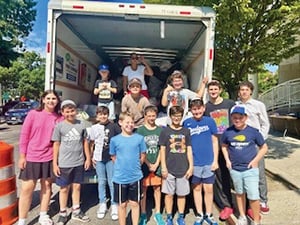
In the lobby was an area for making and packaging sandwiches for the Friendly Fridge, a community refrigerator that redirects food that would have been wasted to the Bronx community instead. The next table was set up for kids to make cards for the local FDNY and NYPD stations, to show their appreciation. Downstairs, booths were set up with representatives from various organizations who were there to educate the community about their missions.
The Gift of Life Marrow Registry provided the opportunity for cheek-swabbing to add people to the registry at https://www.giftoflife.org/swab. Daniella Haim, a campus ambassador, explained: “We try to recruit people to be potential donors for stem-cell or bone-marrow transplants. So, if anyone fighting various types of blood cancers or genetic diseases needs a match, they can possibly be matched with someone in the system. If that person donates, it can be a cure.”
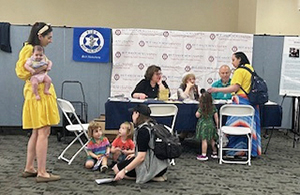
Magen David Adom volunteers Maya and Rachel talked about the important work that medics do and how specially trained animals assist in helping injured patients. Rachel, who used to volunteer for MDA in Israel, brought her trained therapy dog, Charlie. “I bring him to the hospitals to visit patients. The kids love him because he’s big enough that he can rest his head on their beds.”
Jeff Moerdler was the honoree of the event. Moerdler has been a member of Riverdale Hatzalah for the past 20 years, and has been one of its three chiefs for the past 10 years. “We trained for October 7,” Moerdler said. He explained that four years earlier, 160 Hatzalah members went to Israel and trained with the search and rescue teams that have been fighting in the war, as well as the search and rescue teams from around the U.S.. They trained with Magen David Adom in Jerusalem and by the Gaza border.
“We [Hatzalah] have had a long relationship with Magen David Adom,” Moerdler said. He then shared that the Sunday night after October 7, he had a Zoom meeting with the MDA leadership. He asked them what they needed, and they replied, “Bags of equipment.” The next day Hatzalah shipped 500 fully packed equipment bags to Israel. MDA then asked for manual help, since the reservists being called up to fight depleted their staff. “The following Sunday we had the first team of U.S. Hatzalah members fly out there,” said Moerdler. They rotated. They sent a crew of Hatzalah volunteers for a week at a time. The crew would work 24/7 and then go home, as the next crew arrived in Israel. Moerdler was the team leader for the last week in October. His team was stationed in Sderot, Ashkelon, Ashdod, Kiryat Gat and Kiryat Malachi. “It was scary, but we did what we were trained for. We had a crossover. And as with Hatzalah, we could only do it because our families supported us. They understand that we have to run out of Shabbos meals sometimes, or in this case, disappear for eight or nine days to Israel.”
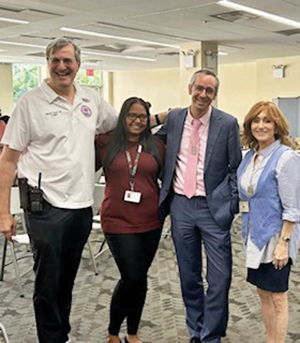
Beit Halochem (FIDV) had a table where people could sit and write Shana Tova cards to two specific soldiers who were wounded in the war. “We try to get the soldiers back to a normal life—as normal as could be,” said the representative. “People lose limbs, people are blind, they have PTSD, and we provide various therapies and scholarships for them.”
Bassie Taubes, the director of community outreach for Ematai, sat at a booth to answer questions. “Ematai is an organization that helps people navigate complicated healthcare and end-of-life issues,” she explained. They have an halachic hotline run by their executive director, Rabbi Dr. Shlomo Brody, available to people 24/7. “Our goal is to help people plan,” said Taubes. “Planning is caring.”
The largest area in the HIR was dedicated to the blood drive. Seryl Ritter, HIR’s member volunteer, runs the drive every year, alongside Natasha Chattar, an account manager with New York Blood Center. “Even though today is not actually 9/11,” said Chattar, “we do this to memorialize 9/11. In this area, there are many first responders who went down there on 9/11—the local firehouse here responded to the call that day—so this is a way for us to give back. This blood drive comes at a very good time because throughout the summer we were in a blood shortage.”
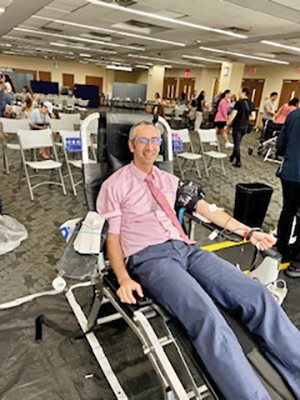
Ritter added that each pint of blood is tripled in the amount of lives it can save. “When the blood comes from the blood drive to the blood center, it’s broken up into components. Each of those components could save a life. If we get 100 pints, that’s potentially 300 lives we can save. We try to situate it close to 9/11, and now October 7, so that people can volunteer and do this chesed in memory of those who perished. We also have a winter drive—these are both periods when the blood centers are at their lowest.”
Rabbi Steven Exler, the rabbi of HIR, said: “Since September 11, we have been trying to do a September Sunday for blood donations to try and save lives, and to build it out into a broader day where people can contribute to acts of chesed. This chesed day is inspired by the spirit of togetherness that New Yorkers felt after September 11. Now it’s hard to say September 11 and not say October 7.”








